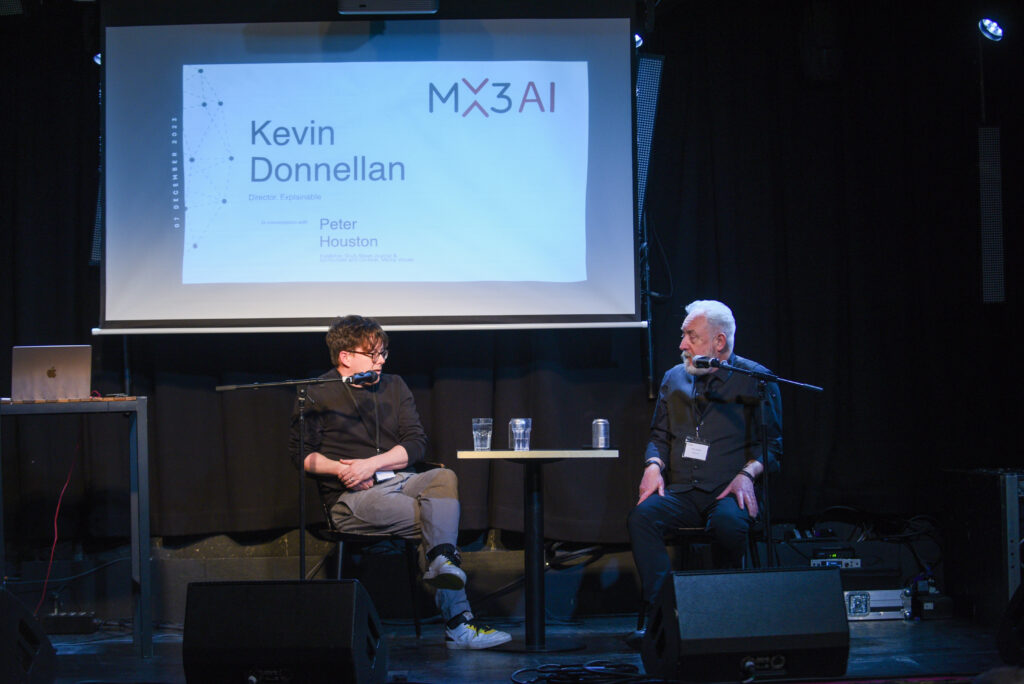It is vitally important to differentiate between rights and risks when developing policies around the use of artificial intelligence in the workplace.
This was a key point when the ethics and policy of AI were examined in an on-stage conversation at the recent Mx3 AI event in London between Kevin Donnellan of @ExplainableLtd and Peter Houston, Grub Street Journal publisher, podcaster and media commentator. Kevin, one of several AI experts sharing their perspectives at the event, highlighted the need for robust AI policies in newsrooms.
He founded @ExplainableLtda newsletter on AI and creativity and an agency for creatives and brands who want to learn about AI.
Developing policies for AI
While the on-stage discussions were off the record, Kevin shared some insights in a subsequent interview, emphasizing how crucial it is to differentiate between rights and risks in workplace AI policies.
Rather than focusing too much on risks and negative narratives, he said, the emphasis should be on a balanced approach that includes employee rights and ethical considerations related to the use of AI.
“If you look at the risks of AI, you’re sort of forced to think about what’s available right now with AI. But if a new tool comes out tomorrow, you’re suddenly late and have to start again.
“If you talk about rights, you talk about the rights of your employees to safe work, that they won’t be at risk if they use AI tools, if they save time. »
Open and honest conversations
In an environment where the focus is on rights, Kevin says, we create a commitment to employees using their time better, which is more beneficial for them and the company. This is not an environment where the employer will say that if AI saves you 20 hours a week, “we might have to get rid of you.”
To achieve this, employers and employees must honestly discuss robust policies that will withstand the rapidly changing AI landscape. These policies may need to be reviewed regularly, with “constant adjustments and iterations.” The key is to foster open and honest conversations with employees, legal experts and other stakeholders.

With AI, is it acceptable to work less?
So what should employees do with their extra time if AI takes over the tedious and mundane tasks? It’s up to employees to decide, Kevin says, even if it’s choosing to run or spend more time with their kids. AI allows us to say goodbye to the days when a clock dictated the workday. “But again, it comes down to honesty (between employer and employee)… People (shouldn’t) feel like they need to be seen as working hard rather than working smart. So I think we probably need to move away from this type of thinking about industrial automation of work where you’re clocking in and clocking out.
“Unfortunately, even today, some of it remains. But if employees are able to show that they are doing their job, and doing it well, in 30 hours a week, what’s the harm in having that while being paid well for it? asked Kevin. But that requires a massive cultural shift, he warned, and he “doesn’t know how ready we are.”
Pay creatives a fair share
Kevin is adamant that creatives should receive their fair share when AI harvests their creations, designs and ideas. He predicts more lawsuits related to AI-generated content, including the work of artists, in 2024. The outcome of these cases will impact both artists and technology companies, calling into question the boundaries fair use.
“A lot of the data sets AI uses to drive sales are the work of artists. And I hope that we’ll start to see a small number of lawsuits ruling in favor of artists… Whether they’re artists, designers, illustrators, musicians or whoever – writers – it is their work that will be decisive. generate huge profits for someone in AI… So yes, we need to find a way to compensate them fairly.
*Watch an edited excerpt from our interview with Kevin here:
Meeting of media creators – live
We would like to see you at our next live events in Spain and Portugal
- Mx3 Barcelona focuses directly on media innovation, with an emphasis on creator-led, mainstream and B2B media operating within and across media verticals. It takes place on March 12 and 13. Click here to find out more.
- The FIPP World Media Congress, which we produce under license from FIPP, will take place June 4-6 in Cascais, Portugal. The flagship global event in the world of magazine media will be the 46th edition since its launch in Paris in 1925. Click here to find out more
**Piet van Niekerk is a retired gas engineer. He also worked as a journalist and editor earlier in his career. Based in Bristol, he now writes about media and content innovation. Send him an email to piet@mediamakersmeet.com



